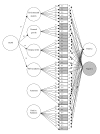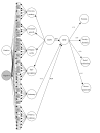Psychometric evaluation and predictive validity of Ryff's psychological well-being items in a UK birth cohort sample of women
- PMID: 17020614
- PMCID: PMC1634744
- DOI: 10.1186/1477-7525-4-76
Psychometric evaluation and predictive validity of Ryff's psychological well-being items in a UK birth cohort sample of women
Abstract
Background: Investigations of the structure of psychological well-being items are useful for advancing knowledge of what dimensions define psychological well-being in practice. Ryff has proposed a multidimensional model of psychological well-being and her questionnaire items are widely used but their latent structure and factorial validity remains contentious.
Methods: We applied latent variable models for factor analysis of ordinal/categorical data to a 42-item version of Ryff's psychological well-being scales administered to women aged 52 in a UK birth cohort study (n = 1,179). Construct (predictive) validity was examined against a measure of mental health recorded one year later.
Results: Inter-factor correlations among four of the first-order psychological well-being constructs were sufficiently high (> 0.80) to warrant a parsimonious representation as a second-order general well-being dimension. Method factors for questions reflecting positive and negative item content, orthogonal to the construct factors and assumed independent of each other, improved model fit by removing nuisance variance. Predictive validity correlations between psychological well-being and a multidimensional measure of psychological distress were dominated by the contribution of environmental mastery, in keeping with earlier findings from cross-sectional studies that have correlated well-being and severity of depression.
Conclusion: Our preferred model included a single second-order factor, loaded by four of the six first-order factors, two method factors, and two more distinct first-order factors. Psychological well-being is negatively associated with dimensions of mental health. Further investigation of precision of measurement across the health continuum is required.
Figures


References
-
- Kahneman D, Diener E, Schwarz N. Well-Being: The Foundations of Hedonic Psychology. New York , Russell Sage Foundation; 1999.
-
- Snyder CR, Lopez SJ. Handbook of Positive Psychology. USA , Oxford University Press, Inc.; 2001.
-
- Huppert FA, Keverne B, Bayliss N. Philosophical Transactions of the Royal Society, Series B. May Vol. 358. 2004. The Science of well-being, Integrating neurobiology, psychology and social science. Proceedings of Royal Society Scientific Discussion Meeting, 19-20 November 2003.
-
- Ryff C, Singer B. The Contours of positive human health. Psychological Inquiry. 1998;9:1–28. doi: 10.1207/s15327965pli0901_1. - DOI
-
- Diener E, Suh EM, Lucas RE, Smith HL. Subjective well-being: Three decades of progress. Psychological Bulletin. 1999;125:276–302. doi: 10.1037/0033-2909.125.2.276. - DOI
Publication types
MeSH terms
Grants and funding
LinkOut - more resources
Full Text Sources
Medical

